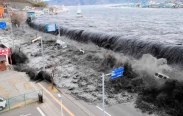Atsunami(海啸)isaseriesof(一系列)hugewavesthatcancausegreatdestruction(毁灭)whentheyhitabeach.Mosttsunamisarecausedbyunderwaterearthquakesbutnotallunderwaterearthquakescausetsunamis.About90percentof
A tsunami(海啸) is a series of(一系列) huge waves that can cause great destruction(毁灭) when they hit a beach. Most tsunamis are caused by underwater earthquakes but not all underwater earthquakes cause tsunamis. About 90 percent of all tsunamis take place in the Pacific Ocean most of them are in Japan. A strong earthquake in the ocean near Japan caused a deadly tsunami on March 11 2011. As of April 25 the number of death had been raised to 14 133 and more than 13 346 people were listed as missing. The word “tsunami” comes from the Japanese word.

Many tsunamis could be found before they hit land with the use of modern technology. If you see the water drawback (后退) quickly and unexpectedly from a beach run toward higher ground or inland -- there may be a tsunami coming. Also if you are on the beach and there is an earthquake it may have caused a tsunami so run toward higher ground or inland. The first wave in a tsunami is often not the largest; if you experience one unusually-huge wave go inland quickly -- even bigger waves could be coming soon.
Do you know the story of the "angel(天使) of the beach"? Tilly A 10-year-old English schoolgirl who saved the lives of hundreds of people in Phuket Thailand in the Asian Tsunami of 2004 by warning them a wall of water was about to strike(袭击) after learning about tsunamis in geography class. “Last term geography teacher Andrew Kearney taught us about earthquakes and how they can cause tsunamis ” Tilly said to the reporter.“I was on the beach and the water started to go funny. There were bubbles and the water went out all of a sudden. I recognised what was happening and had a feeling there was going to be a tsunami. I told mummy.”
1. An earthquake may cause a tsunami.
A. in the city B. in the country C. under the water
2. When the tsunami is coming we should .
A. run towards the higher place or inland
B. run to the playground
C.run into a house
3. Tilly saved hundreds of people’s life in .
A. Japan B. Tailand C. the United Kingdom
4. Tilly recognised there would be a tsunami because .
A. her geography teacher told her.
B. she found the water drawback unusually quickly
C. she had a feeling about the earthquake
5. Which of the following statement is TRUE according to the passage?
A. The word “tsunami” is from Japanese because most recorded tsunamis in the world took place in Japan
B. Tsunami can only be found by modern technology before it hit the land.
C. Tsunami only happens in the Pacific Ocean
分 析:
本文介绍的是海啸,海啸是怎样引起的,发生海啸的前兆,发生海啸时应该怎么做。Tilly就根据发生海啸的前兆特征挽救了在泰国普吉岛度假的上千人的生命。1.根据原文Most tsunamis are caused by underwater earthquakes 可知海啸是由于地下水的剧烈震动而引起的。故选C。2.根据原文If you see the water drawback quickly and unexpectedly from a beach run toward higher ground or inland可知如果遇到海啸,要迅速朝高地跑。故选A。3.根据原文Tilly A 10-year-old English schoolgirl who saved the lives of hundreds of people in Phuket Thailand可知Tilly在泰国普吉岛救了上千人的生命。故选B。4.根据原文I was on the beach and the water started to go funny. There were bubbles and the water went out all of a sudden.可知她发现海面有泡沫,海水迅速的退回。故选B。5.根据原文About 90 percent of all tsunamis take place in the Pacific Ocean most of them are in Japan.及 The word “tsunami” comes from the Japanese word.可知海啸这个词来自日语,因为日本是海啸多发的地区。故选A。
考点:
科普环保类短文阅读。
根据合同法的规定,标的物提存后,毁损、灭失的风险( )。A.由债权人承担B.由债务人承担C.由债权人 2020-05-19 …
破产企业内属于他人的财产,在法院受理破产案件后、宣告破产前毁损、灭失的,财产权利人只能以其直 2020-05-19 …
买受人接到出卖人的书面交房通知,无正当理由拒绝接收的,房屋毁损、灭失的风险自( )起,由买 2020-05-19 …
出卖人出卖交由承运人运输的在途标的物,除当事人另有约定的以外,毁损、灭失的风险自合同 2020-05-22 …
承运人证明货物的毁损、灭失是因不可抗力、货物本身的自然性质或者合理损耗以及托运人、 2020-05-22 …
标的物提存后,在提存期内提存物发生毁损或灭失风险的,其后果承担者是( )。 2020-05-22 …
保管期间,因保管人保管不善造成保管物毁损、灭失的,对于该损失( )。 2020-05-22 …
根据《合同法》的规定,在运输合同中,对货物毁损、灭失的赔偿额,当事人没有约定的,计算赔偿 2020-05-22 …
出卖人出卖交由承运人运输的在途标的物,除当事人另有约定的以外,毁损、灭失的风险自合同成立时起 2020-05-22 …
标的物提存后,在提存期内提存物发生毁损或灭失风险的,其后果承担者是( )。 A.债务人B. 2020-05-22 …